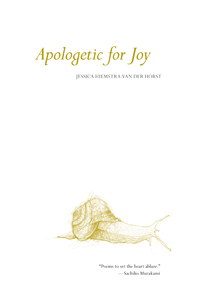Reviews
Poetry Review by Tanya Lester
Jessica Hiemstra-van der Horst's Apologetic for Joy
Jessica Hiemstra van-der Horst, Apologetic for Joy (Fredericton: Goose Lane, 2011). Paperbound, 117 pp., $17.95.
Reading Apologetic for Joy was, for me, like peeling an orange on a hot
day and greedily biting into its juicy flesh. Wanting more, I eagerly
turned each page to delight in the next surprise.
Hiemstra-van der Horst is not a stranger to pain, nor insensitive
toward the pain of others, but she cannot resist returning to a joyful
place in her poetry. When the poet turns to writing about grievous
experiences, it is understandable how the book got its title. Apologetic
for Joy is presented in seven parts, inviting the reader in with freehand
drawings by the poet (who is also a visual artist) at the beginning of
each section, which frequently leads into a different country where she
has visited or lived. Often it is as if the poet delights in random images
tossed into her consciousness. In “Anatomy for the Artist (Standing
Posture, Study I),” she writes “... an orange / rolling across the floor,
the way you peeled / that artichoke, me, starting with my mouth.” In
“Yes, Love” she toys with putting more order into her poetry: “When
you’re asleep, I dream / a diagram, a and b and c.” She puts hair and a
stray eyelash into the ”a” part, her lover’s foot in the ”b” section, and
“how it is to sleep in the curves / of you” in the ”c.” It is appreciated
that she does not force her poetry too tightly into structure.
Apologetic for Joy is a pleasure to read because the poetry remains as
artfully loose as the drawings. Many of the poems are confessional. “I
can’t believe / I told you I want to own you,” she writes in “Anatomy for
the Artist (Light, Study III).” In “Georgia’s Recipes Somehow,” she
admits to hiding Georgia’s Kitchen (probably in reference to Margaret
Wood’s A Painter’s Kitchen: Recipes from the Kitchen of Georgia O’Keeffe)
in her cupboard so she can satisfy her guilty pleasure of gazing at pictures
of the famous artist’s apron and pantry door.
Much of Hiemstra-van der Horst’s poetry is spiked with humour
and wit. In “We were both wrong, or maybe it’s a spelling mistake,”
she writes of her discovery that the place buses stop to pick up passengers
in a South African community is called a bus-rank; the joke being
“is one bus better than another?” The poet displays a sombre side when
death haunts her poems. In one, a South African friend phones to tell
of her husband’s death. In “An Apologetic to Cockroaches from the
Future,” partly about a boy the poet witnesses in his near-death experience
from a spider’s bite, she writes “a child can vindicate us. He
proves how close to holiness we are / when we are frightened.” This
holiness seems to permeate poems like “Oma rode a bicycle for four
years in a room of mattresses,” in which the poet is inspired to declare
the “heart is where we store honey and purpose. It is / a house balanced on song and a bicycle, a place for bees to touch down / and
make pleasure, or whatever / it is they do.” Mingling in the grief is the
joy of celebrating Oma’s life. This wonderful concoction of holy grief
and joy, peppered with humour, spills over into three poems, including
a long one called “Excerpts from Gerald, God and the Chickens,”
where the poet presents the reader with the way a schizophrenic
thinks. From his point of view, “God slips in through the window, /
but this Sunday he tells Gerald he’s weary of church. / The hymns are
lovely, he says, but I’m tired / of sermons, crusades…It’s only the memory of
love, he says, / there’s nothing left to believe. Isaiah made promises / I couldn’t
keep, prayers reduced to words.”
Apologetic for Joy is a collection of poems on subjects most poets would never consider writing about, at least not in the tone and style that Hiemstra-van der Horst employs. It is literary and a page-turner at the same time.
—Tanya Lester









